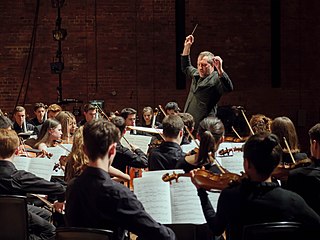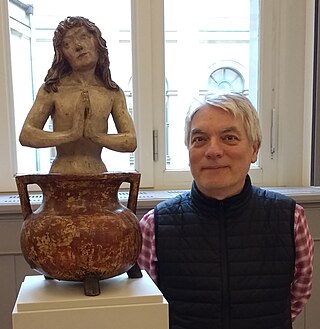Related Research Articles

Stuart Oliver Knussen was a British composer of contemporary classical music and conductor. Among the most influential British composers of his generation, his relatively few compositions are "rooted in 20th-century modernism, [but] beholden to no school but his own"

Thomas Joseph Edmund Adès is a British composer, pianist and conductor. Five compositions by Adès received votes in the 2017 Classic Voice poll of the greatest works of art music since 2000: The Tempest (2004), Violin Concerto (2005), Tevot (2007), In Seven Days (2008), and Polaris (2010).
Julian Anderson is a British composer and teacher of composition.
Colin Matthews, OBE is an English composer of contemporary classical music. Noted for his large-scale orchestral compositions, Matthews is also a prolific arranger of other composer's music, including works by Berlioz, Britten, Dowland, Mahler, Purcell and Schubert. Other arrangements include orchestrations of all Debussy's 24 Préludes, both books of Debussy's Images, and two movements—Oiseaux tristes and La vallée des cloches—from Ravel's Miroirs. Having received a doctorate from University of Sussex on the works of Mahler, from 1964–1975 Matthews worked with his brother David Matthews and musicologist Deryck Cooke on completing a performance version of Mahler's Tenth Symphony.

The London Sinfonietta is an English contemporary chamber orchestra founded in 1968 and based in London.
Derek Bermel is an American composer, clarinetist and conductor whose music blends various facets of world music, funk and jazz with largely classical performing forces and musical vocabulary. He is the recipient of various awards including a Guggenheim Fellowship and the American Academy in Rome's Rome Prize awarded to artists for a year-long residency in Rome.
Philip Cashian is an English composer. He is the head of composition at the Royal Academy of Music.
Bernard Rands is a British-American contemporary classical composer. He studied music and English literature at the University of Wales, Bangor, and composition with Pierre Boulez and Bruno Maderna in Darmstadt, Germany, and with Luigi Dallapiccola and Luciano Berio in Milan, Italy. He held residencies at Princeton University, the University of Illinois, and the University of York before emigrating to the United States in 1975; he became a U.S. citizen in 1983. In 1984, Rands's Canti del Sole, premiered by Paul Sperry, Zubin Mehta, and the New York Philharmonic, won the Pulitzer Prize for Music. He has since taught at the University of California, San Diego, the Juilliard School, Yale University, and Boston University. From 1988 to 2005 he taught at Harvard University, where he is Walter Bigelow Rosen Professor of Music Emeritus.
Mark Simpson is a British composer and clarinettist from Liverpool. In 2006, he became notable for winning both the BBC Young Musician of the Year and the BBC Proms/Guardian Young Composer of the Year, making him the first and, to date, only person to win both competitions.

Simon Holt is an English composer.
David Bruce is a British composer and a YouTuber.
Dai Fujikura is a Japanese-born composer of contemporary classical music.
Richard Ayres is a British composer and music teacher.
Huw Thomas Watkins is a British composer and pianist. Born in South Wales, he studied piano and composition at Chetham's School of Music in Manchester, where he received piano lessons from Peter Lawson. He then went on to read music at King's College, Cambridge, where he studied composition with Robin Holloway and Alexander Goehr, and completed an MMus in composition at the Royal College of Music, where he studied with Julian Anderson. Huw Watkins was awarded the Constant and Kit Lambert Junior Fellowship at the Royal College of Music, where he used to teach composition. He is currently Honorary Research Fellow at the Royal College of Music.
Dave Maric is a British composer and musician.
Charlotte Bray is a British composer. She was championed by the Royal Opera House Covent Garden, London Sinfonietta and Birmingham Contemporary Music Group, BBC Symphony Orchestra. Her music has been performed by many notable conductors such as: Sir Mark Elder, Oliver Knussen, Daniel Harding, and Jac van Steen.
Rolf Hind is a British pianist and composer. He studied at the Royal College of Music in London and at the University of California, Los Angeles.
Chamber Symphony is a 1992 composition for a 15-member chamber orchestra by American composer John Adams, inspired by Arnold Schoenberg's Chamber Symphony No. 1, Op. 9. It is a three-movement work that takes about 23 minutes to perform.
Scheherazade.2 is a dramatic symphony for solo violin and orchestra by the American composer John Adams. The work was jointly commissioned by the New York Philharmonic, the Concertgebouw & the Royal Concertgebouw Orchestra, and the Sydney Symphony Orchestra. It was written specifically for the violinist Leila Josefowicz, who performed its world premiere with the New York Philharmonic under Alan Gilbert at Avery Fisher Hall on March 26, 2015.
Joseph Phibbs is an English composer of orchestral, choral and chamber music. He has also composed for theatre, both in the UK and Japan. Since 1998 he has written regularly to commissions for Festivals, for private sponsors, and for the BBC, which has broadcast premieres of his orchestral and chamber works from the Proms and elsewhere. His works have been given premieres in Europe, the United States and the Far East, and he has received prestigious awards, including most recently a British Composer Award, and a Library of Congress Serge Koussevitzky Music Foundation Award. Many of his works have been premiered by leading international musicians, including Dame Evelyn Glennie, Esa-Pekka Salonen, Leonard Slatkin, Sakari Oramo, Vasily Petrenko, Gianandrea Noseda, and the Belcea Quartet.
References
- ↑ Anderson, Martin (April 1999). "The 1998 Proms II: Politics and Premières". Tempo. New Series. 2 (208): 69–73. ISSN 0040-2982. JSTOR 944682.
- ↑ Allan Kozinn (11 August 1998). "Surprise, an Adventurous Counterpoint". The New York Times. Retrieved 2008-03-15.
- ↑ "John Adams - Gnarly Buttons". www.boosey.com. Retrieved 2023-09-11.
- ↑ "John Adams: 'Grand' And 'Gnarly' In Concert". npr.org. National Public Radio. 1 August 2008. Retrieved 2014-12-04.